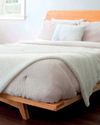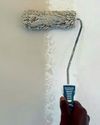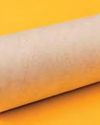
Something that is very odd given that both materials are made from the same basic ingredients; cement, aggregates and water. The basic chemistry is the same for both concrete and screed – the cement and water forms a paste and coats the surface of the sand or the aggregates, and the cement paste hardens by a process called hydration, forming a hardened mass of high strength and durability.
However, the size of aggregates used is different, the grade of the cement used is different, the mix consistency and finish is different – because both materials intended use is very different!
Concrete has a much coarser mixture than screed, consisting of larger, hard-core aggregates, which are the key element that gives it its durability and makes it strong and long lasting.
Because concrete has the potential to hit very high strengths, it is used across the construction industry for structural purposes – including floor slabs. It is the most used man-made material in the world. Screed, however, is a smoother mix, which consists of considerably less aggregates to that of the mix used for concrete.
Screed is usually applied on top of the concrete slab and is most commonly used as a finishing layer on internal floors or to level the floor prior to final floor coverings carpet, tiles, natural stone, linoleum, wood flooring, resin coatings etc.
Screeds are required when a colourful or functional floor is needed rather than a bare concrete surface. For industrial purposes, or commercial locations, which will undergo frequent traffic, a more robust screed is required than is used in DIY or residential projects.
この記事は The Home Handyman の March/April 2021 版に掲載されています。
7 日間の Magzter GOLD 無料トライアルを開始して、何千もの厳選されたプレミアム ストーリー、9,000 以上の雑誌や新聞にアクセスしてください。
すでに購読者です ? サインイン
この記事は The Home Handyman の March/April 2021 版に掲載されています。
7 日間の Magzter GOLD 無料トライアルを開始して、何千もの厳選されたプレミアム ストーリー、9,000 以上の雑誌や新聞にアクセスしてください。
すでに購読者です? サインイン

SLEEP IN STYLE
This queen bed has a low profile yet it still has some unique design aspects. I used a hardwood and that made this project a little more difficult, but overall, I'm happy with how it turned out.

Paint roller tip for clean corners
When painting a room, I've found that wrapping a small sandwich bag around the roller's edge works wonders for clean corners.

Cable organiser using toilet paper rolls
Here's a clever little hack to keep your cables neat and tidy.

Metal cutting tools for home projects
I'm looking to get into metalworking and want to start with a few basic home projects, like making small furniture items and maybe even some sculptures.

Pleasurable plumbing
I just wanted to express my appreciation for your recent article on DIY plumbing fixes.

MAKE SOME NOISE!
Are you ready to embark on a musical adventure and create your very own drum kit from recycled materials? Get ready to unleash your creativity and make some noise with this fun and eco-friendly DIY project. Let’s dive into the step by-step guide and bring your mini band to life!

DIY HOME APPLIANCE REPAIR
From the whirring of the washing machine to the gentle hum of the refrigerator, our trusty home appliances keep our households running smoothly. But what happens when these essential gadgets start to falter?

EFFECTIVE METHODS FOR A PEST-FREE HOME
Pests, those unwelcome guests, can turn our homes into uncomfortable environments, disrupting our peace and posing health risks.

COMMON SEALANTS FOR DIY USE
By familiarising themselves with the diverse array of sealants available, mastering proper application techniques, and prioritising safety at every step, DIY'ers and homeowners in South Africa can tackle sealing projects with confidence and achieve lasting results that enhance the comfort, efficiency, and aesthetics of their homes.

UNLOCKING THE POWER OF ANGLE GRINDERS
In the world of DIY, few tools are as versatile and indispensable as the angle grinder. From cutting and grinding to polishing and sharpening, this powerhouse tool is a must have for any homeowner or DIY enthusiast.